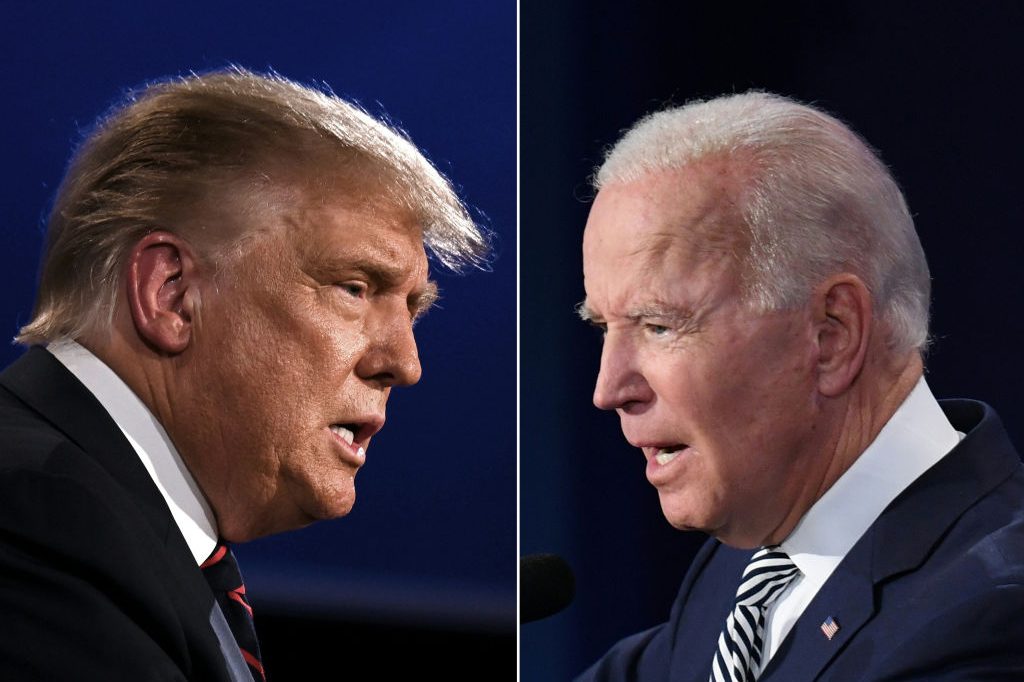Are you desperate for a deal? Usually the start of a new year provides the patient ones among us the chance to snag a bargain in the January sales. Good things come to those who wait, the old adage goes. Yet 2024 seems set to offer us more of the same. The usual stalls are at the market — all of them trying to hawk shoddy wares to Americans.
Take the primary process for our presidential elections, which kicks off in Iowa and New Hampshire this month. If the prognosticators are to be trusted, we are set for a rematch between President Biden and former President Trump. Biden’s approval rating doesn’t seem to be improving and the cries for him to drop out and let a younger candidate step in are still sounding — and they come from more and more prominent people every day. His poll numbers against Trump, however, seem to have rebounded, which has drowned out the clamor at least somewhat. A Gavin Newsom-Kamala Harris brawl for the top of the Democratic ticket appears unlikely, unless winter is particularly cruel to President Biden, but the drama would at least proffer a bit of early year excitement.
On p.32, Ben Domenech dives into the Democrats’ Israel problem. Their fringe, it turns out, doesn’t seem to like the Jewish state very much and the coalition of left-wing activists and mainstream liberals is fracturing over Biden’s support for Jerusalem. His administration might have a hard time keeping progressives on side, especially those who voted for him last time and now have buyer’s remorse. The war with Hamas is more than likely to continue through the year — which threatens to turn off young voters, who, most polling indicates, are not Israel supporters. While their voting GOP may not be a worry for Biden, those voters staying home certainly is, especially when he only narrowly won the presidency in 2020 by under 45,000. In Michigan, Biden won by a mere 154,000 votes. Even a drop of 1-2 percent of turnout in Detroit or Dearborn, home to a large Muslim population, could lose him the state. That’s not to mention Jewish voters in neighboring Oakland County potentially abandoning him all together if Biden ever goes soft on Israel.
On the Republican side, Trump still dominates the polls, topping his closest opponents by anywhere from twenty to forty points. But what happens when people go to vote? The field has been narrowing, which means the non-Trump voters split between seven or eight candidates will most likely be left with just two or three options. As voting blocs coalesce, Trump’s lead is bound to be narrowed. Potentially a single not-Trump option will emerge earlier than in 2016, when the vote continued to be split until it was too late. Will it be Ron DeSantis or Nikki Haley? Both southern governors are eager to present a histrionics-free alternative to the Bad Orange Man — but to win a Republican primary, you need to pick off his voters and pitch to his base. That could mean trying to out-Trump Trump — and coming across like a knockoff of the main brand.
Many swing voters will make their choice this year by voting their pocketbook. And yes, most indicators that economists follow point to a still humming economy. But talk to average Americans and they’ll tell you they feel more strapped than ever. If that climate carries on, it will be tough for Biden to make the case that he’s better for the economy, even if the economists say it’s in great shape. Normal folk don’t love being told by academics they should be happy with inter- est rates higher than they’ve been in decades and the cost of groceries, gas and a number of other household items continuing to stretch consumers.
The touted improvements are, to quote Michael Gerson, a soft bigotry of low expectations — the Biden administration sets the economic bar lower and lower to make it easier to jump. Quelle surprise, selling something as an improvement when it clearly isn’t doesn’t seem to be working. Add to that the prospect of a long-predicted recession hitting right before the election a Biden second term becomes more and more unlikely. The uncertainty leaves a lane open for radical populists to deliver a strong rebuke.
If we do have a Biden-Trump matchup, or even a Biden-DeSantis bout, it will be a repeat performance of the rise of populism we’ve seen around the world. We’ve had Trump, Brexit, Meloni, Orbán, Bolsonaro — and now, bringing us into 2024, the ascent of an old hand in the Netherlands and a newcomer in Argentina. The far-right Freedom Party pulled off an upset in the recent Dutch elections, bringing to the fore Geert Wilders, the Dutch version of Nigel Farage — an infamous verbal bomb-thrower. Meanwhile, newbie Javier Milei burst onto the scene and defied the odds to win the Argentinian presidency. The extremely quotable and weirdly charismatic economist brings a brand of populist libertarianism the likes of which the world hasn’t really seen to its eighth-largest country.
When consumers are bored with the same old products, they start to shop further afield — or they leave the store altogether. In America, our offerings are long past their sell-by date.
This article was originally published in The Spectator’s January 2024 World edition.


























Leave a Reply